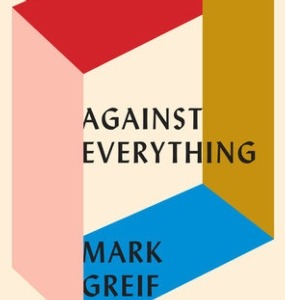"Tell the truth and shame the devil". That phrase followed me around as a child, nipping at the bare ankles of misdoings and misdemeanours. Adrienne Rich would pare back this saying: "Tell the truth". Then you can stop worrying about the devil.
ARTS OF THE POSSIBLEAdrienne Rich
Norton
256 pp
$13.95 And what a truth Adrienne Rich brings us, confronts us with and urges us towards. Not all of these essays gleaned from a thirty-odd year period, from 1971 to the late 90s, are consistently successful, but an absolute and honest understanding of what truth is and what lying entails always burns through. Rich believes in a truth bigger than herself and therefore sees the complexity of seeking truth in either art or politics. Her way of exposing the naked contradictions, problems and possibilities of trying to enact change through a political-aesthetic dialectic is inspiring.
Inspiring is no exaggeration. Some more chaste readers may blanch at this next revelation, but I maul books: I scribble in margins, bend pages, use inside covers as note-pads. In the final and title essay of The Arts of the Possible, in testimony to its inspirational capacity, I wanted to do more damage. I wanted to tear pages from the book and carry them around with me in my bag, to take them out, to read them again. I will return to why, and why these pages, later. But for the moment let me just say it was because they are true.
As an artist Rich is, first and foremost, true poetically. She has unnerving sureness of touch. Those who know her poetry will know this already. But what magnificent yet subtle truth there is in lines such as: "The lie is a short cut through another's personality" from the 1975 (published 1977) essay 'Women and Honour': some notes on lying. Didn't you know this was true without ever having known how to say it perhaps without ever having thought to say it at all? Likewise, the gut-wrenching, conscience-tugging, tub-thumping exactitude of "Apartheid of the imagination becomes a blockage in the throat of poetry" (from 'Defining the Space that Separates', 1996). Abstraction returned to the spittle of reality. This is the great strength of Rich, both as artist and as activist.
As an activist, then, Rich is, first and foremost, true politically. She approaches the world with absolute commitment, and we read her in the knowledge that she will not compromise. She returns the poetic and political imagination to the world, to human relations, to us, uncompromisingly. Even in the essays that I felt were fragmentary perhaps because they were written as diverse notes when I wanted the drive of argument there is galvanising engagement. Rich touches upon life as if it were an electric eel, both organic and shocking.
Rich is most successful when she has something to engage with and something to touch upon. She then becomes not merely another poet plucking the strings of abstraction but the body electric of our time. And she sings that body electric beautifully.
All humanists, all Marxists, should read her essay on Raya Dunayevskaya's Marx. There is a sense, as Rich so perceptively opens the essay remarking upon, that we are as Dunayevskaya describes herself illiterate until engaged truthfully with experience. Through Dunayevskaya the radical-feminist-lesbian-poet-activist Rich who had thrown off Marx in the 60s and 70s returns again to discover Marx's humanism, and discovers something transfiguring, "beautiful and compelling".
The Dunayevskaya essay, written in 1991, marked, in my reading, a turning point, a need in Rich to re-examine what had been cast away in the heat of the cultural revolutions and liberation movements of the 60s and 70s. It was not Rich's reading of Marx that I found inspiring, but her re-reading of Marx. In the introduction to her essays Rich calls Marx the "great geographer of the human condition". In turn she herself proves in her certainty, her sureness, her trust not only to be a competent navigator but an explorer of immense vision in traversing the complex cartography of Marx's canon and the Marxist legacy. She does not approach Marxism as a heart of Stalinist darkness but sees the humanism at the heart of Marx's vision. As a poet and activist she realises that imagination means nothing if it fails to return to reality and engage with the politics of its time.
This is clear and true in the last essay. The pages I wanted to tear out include these lines:
Marx was passionate about the insensibility of a system that must extract ever more humanity from the human being: time and space for love, for sleep and dreaming, time to create art, time for both solitude and communal life, time to explore the idea of an expanding universe of freedom. And if you cannot see the truth of what is being said here, then the devil is ashamed for you.
Arts of the Possible is available from Amazon (UK).

